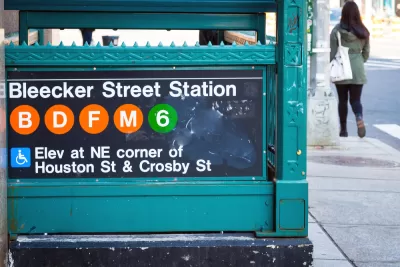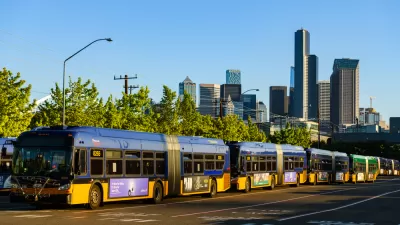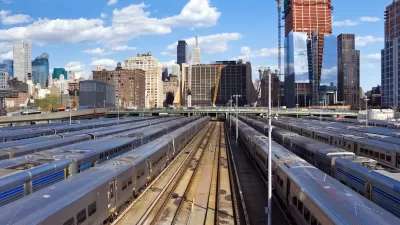Transit can advance social equity and provide access to opportunity—but only if agencies work for inclusive planning and resource allocation.

A new report from TransitCenter lays out guidelines for transit agencies seeking to better serve communities that have historically been cut out of planning and investment initiatives and that depend on public transportation. Angie Schmitt summarizes the report's six key recommendations for Streetsblog USA.
The broadest recommendation is to proactively address inequities across both system investment and agency leadership. "In many regions, suburban interests are overrepresented in transit agency leadership, skewing policy to favor well-off commuters from bedroom communities," Schmitt writes. "Decisions about major capital investment may also be dictated by property owners or other narrow constituencies whose interests don't align with providing good transit to people who need it."
Other recommendations include:
-
Progressive fares: To avoid disproportionately burdening the people who rely on transit the most, agencies should "fund transit budgets with progressive sources of revenue to the extent possible," Schmitt explains.
-
Decriminalize fare evasion: Transit agencies can follow the lead of Manhattan, D.C., and Portland, which have taken steps toward decriminalizing fare evasion. If fare payment is enforced, agencies should deploy agency staff rather than police in order to avoid potential escalation—and they should keep track of race and income of riders stopped or penalized.
-
Invest in affordable housing: TransitCenter recommends that agencies promote denser development and reduced parking requirements surrounding major transit stations. Because in metro areas like New York and California, transit-oriented development has been shown to fuel gentrification and displacement, the report also recommends promoting affordable housing.
FULL STORY: 6 Principles for a Transit System That Makes Your City More Fair and Just

Maui's Vacation Rental Debate Turns Ugly
Verbal attacks, misinformation campaigns and fistfights plague a high-stakes debate to convert thousands of vacation rentals into long-term housing.

Planetizen Federal Action Tracker
A weekly monitor of how Trump’s orders and actions are impacting planners and planning in America.

In Urban Planning, AI Prompting Could be the New Design Thinking
Creativity has long been key to great urban design. What if we see AI as our new creative partner?

King County Supportive Housing Program Offers Hope for Unhoused Residents
The county is taking a ‘Housing First’ approach that prioritizes getting people into housing, then offering wraparound supportive services.

Researchers Use AI to Get Clearer Picture of US Housing
Analysts are using artificial intelligence to supercharge their research by allowing them to comb through data faster. Though these AI tools can be error prone, they save time and housing researchers are optimistic about the future.

Making Shared Micromobility More Inclusive
Cities and shared mobility system operators can do more to include people with disabilities in planning and operations, per a new report.
Urban Design for Planners 1: Software Tools
This six-course series explores essential urban design concepts using open source software and equips planners with the tools they need to participate fully in the urban design process.
Planning for Universal Design
Learn the tools for implementing Universal Design in planning regulations.
planning NEXT
Appalachian Highlands Housing Partners
Mpact (founded as Rail~Volution)
City of Camden Redevelopment Agency
City of Astoria
City of Portland
City of Laramie





























